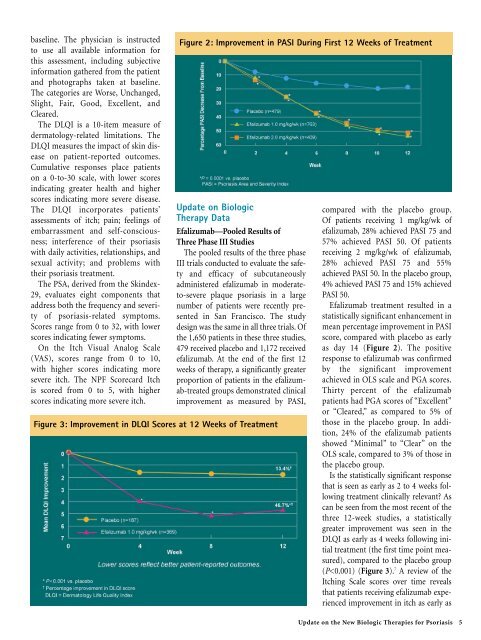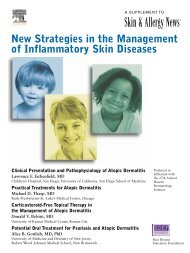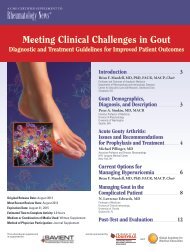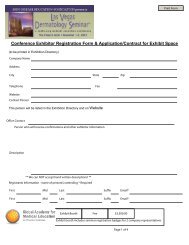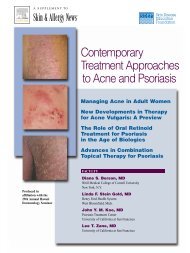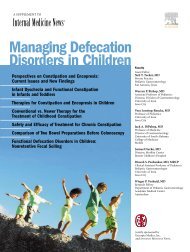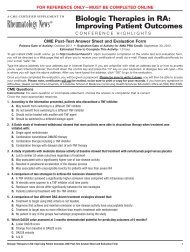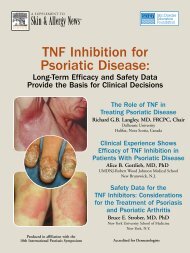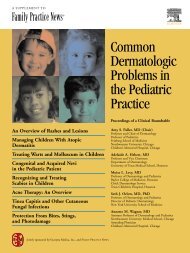Overview Of Psoriasis - Global Academy for Medical Education
Overview Of Psoriasis - Global Academy for Medical Education
Overview Of Psoriasis - Global Academy for Medical Education
You also want an ePaper? Increase the reach of your titles
YUMPU automatically turns print PDFs into web optimized ePapers that Google loves.
aseline. The physician is instructed<br />
to use all available in<strong>for</strong>mation <strong>for</strong><br />
this assessment, including subjective<br />
in<strong>for</strong>mation gathered from the patient<br />
and photographs taken at baseline.<br />
The categories are Worse, Unchanged,<br />
Slight, Fair, Good, Excellent, and<br />
Cleared.<br />
The DLQI is a 10-item measure of<br />
dermatology-related limitations. The<br />
DLQI measures the impact of skin disease<br />
on patient-reported outcomes.<br />
Cumulative responses place patients<br />
on a 0-to-30 scale, with lower scores<br />
indicating greater health and higher<br />
scores indicating more severe disease.<br />
The DLQI incorporates patients’<br />
assessments of itch; pain; feelings of<br />
embarrassment and self-consciousness;<br />
interference of their psoriasis<br />
with daily activities, relationships, and<br />
sexual activity; and problems with<br />
their psoriasis treatment.<br />
The PSA, derived from the Skindex-<br />
29, evaluates eight components that<br />
address both the frequency and severity<br />
of psoriasis-related symptoms.<br />
Scores range from 0 to 32, with lower<br />
scores indicating fewer symptoms.<br />
On the Itch Visual Analog Scale<br />
(VAS), scores range from 0 to 10,<br />
with higher scores indicating more<br />
severe itch. The NPF Scorecard Itch<br />
is scored from 0 to 5, with higher<br />
scores indicating more severe itch.<br />
Figure 2: Improvement in PASI During First 12 Weeks of Treatment<br />
Update on Biologic<br />
Therapy Data<br />
Efalizumab—Pooled Results of<br />
Three Phase III Studies<br />
The pooled results of the three phase<br />
III trials conducted to evaluate the safety<br />
and efficacy of subcutaneously<br />
administered efalizumab in moderateto-severe<br />
plaque psoriasis in a large<br />
number of patients were recently presented<br />
in San Francisco. The study<br />
design was the same in all three trials. <strong>Of</strong><br />
the 1,650 patients in these three studies,<br />
479 received placebo and 1,172 received<br />
efalizumab. At the end of the first 12<br />
weeks of therapy, a significantly greater<br />
proportion of patients in the efalizumab-treated<br />
groups demonstrated clinical<br />
improvement as measured by PASI,<br />
Figure 3: Improvement in DLQI Scores at 12 Weeks of Treatment<br />
compared with the placebo group.<br />
<strong>Of</strong> patients receiving 1 mg/kg/wk of<br />
efalizumab, 28% achieved PASI 75 and<br />
57% achieved PASI 50. <strong>Of</strong> patients<br />
receiving 2 mg/kg/wk of efalizumab,<br />
28% achieved PASI 75 and 55%<br />
achieved PASI 50. In the placebo group,<br />
4% achieved PASI 75 and 15% achieved<br />
PASI 50.<br />
Efalizumab treatment resulted in a<br />
statistically significant enhancement in<br />
mean percentage improvement in PASI<br />
score, compared with placebo as early<br />
as day 14 (Figure 2). The positive<br />
response to efalizumab was confirmed<br />
by the significant improvement<br />
achieved in OLS scale and PGA scores.<br />
Thirty percent of the efalizumab<br />
patients had PGA scores of “Excellent”<br />
or “Cleared,” as compared to 5% of<br />
those in the placebo group. In addition,<br />
24% of the efalizumab patients<br />
showed “Minimal” to “Clear” on the<br />
OLS scale, compared to 3% of those in<br />
the placebo group.<br />
Is the statistically significant response<br />
that is seen as early as 2 to 4 weeks following<br />
treatment clinically relevant? As<br />
can be seen from the most recent of the<br />
three 12-week studies, a statistically<br />
greater improvement was seen in the<br />
DLQI as early as 4 weeks following initial<br />
treatment (the first time point measured),<br />
compared to the placebo group<br />
(P


